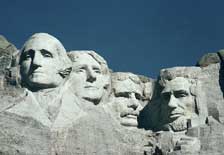Afterword

The faces of four of the most admired American presidents were carved by Gutzon Borglum into the southeast face of Mount Rushmore in South Dakota, beginning in 1927. From left to right, they are: George Washington, commander of the Revolutionary Army and first president of the young nation; Thomas Jefferson, author of the Declaration of Independence; Theodore Roosevelt, who led the country toward progressive reforms and a strong foreign policy; and Abraham Lincoln, who led the country through the Civil War and freed the slaves.
(AP/WWP)
From its origins as a set of obscure colonies hugging the Atlantic coast, the United States has undergone a remarkable transformation into what political analyst Ben Wattenberg has called "the first universal nation," a population of almost 300 million people representing virtually every nationality and ethnic group on the globe. It is also a nation where the pace and extent of change -- economic, technological, cultural, demographic, and social -- is unceasing. The United States is often the harbinger of the modernization and change that inevitably sweep up other nations and societies in an increasingly interdependent, interconnected world.
Yet the United States also maintains a sense of continuity, a set of core values that can be traced to its founding. They include a faith in individual freedom and democratic government, and a commitment to economic opportunity and progress for all. The continuing task of the United States will be to ensure that its values of freedom, democracy, and opportunity -- the legacy of a rich and turbulent history -- are protected and flourish as the nation, and the world, move through the 21st century.
